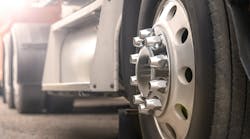Increase fuel efficiency by employing wheel seals with lower friction generation
Scotseal X-Treme
SKF manufactures wheel bearings and the seals that protect them. Cengiz Shevket, SKF’s North America president of vehicle aftermarket sales, told FleetOwner that in the U.S., the industry primarily uses oil to lubricate its wheel bearings. Wheel bearing seals help keep the oil in place and keep out dirt or debris that could prevent smooth operation of the wheel bearing. “If you don’t protect that oil and the lubrication,” Shevket said, “bearings fail.”
This past fall, SKF released a new seal, Scotseal X-Treme. This seal features a new design with new materials that help it run 50 degrees Fahrenheit cooler than competitors’ seals. This contributes to less wear. As a result, SKF’s seals last longer—up to 10 times longer than SKF’s nearest competitor, Shevket told FleetOwner.
The seal’s durability results from lower friction and reduced heat generation, equating to a reduction in power loss—up to “50% less power loss per seal, per wheel end,” Shevket explained.
See also: Gaskins: To focus on safety is to focus on efficiency
Through SKF’s calculations, Shevket estimated that using the Scotseal X-Treme could help fleets save up to 10 gallons of fuel per seal used. “(A tractor) has six seals,” Shevket said. “If it has a trailer, you add four more. ... Then look at the entire fleet of 100, 200, 300 vehicles—it adds up pretty quickly.”
When designing the new seal, Shevket said the team wasn’t striving for increased fuel economy. The team was focused on improving reliability. “We were working on reduced downtime and improved cost management,” he said. “But we realized very quickly that it had this (fuel economy) benefit.”
Though the Scotseal X-Treme seals have this additional fuel savings benefit, SKF’s customers don’t necessarily choose SKF’s seals for improved fuel efficiency, Shevket told FleetOwner. Instead, they choose them because of their durability. He gave the example of a company that operates in a hot climate and replaced seals as often as once a week before using SKF seals. Shevket said the fleet has used Scotseal X-Treme for six months now, and not a drop of oil has leaked—a testament to their durability versus other seals.
Increased ROI, less downtime
SKF’s primary goal is to keep vehicles on the road, Shevket said. The fuel economy improvement is simply a bonus. And it’s a bonus that could positively affect fleets feeling the impact 2023 had on the trucking industry. In 2023, no fleet was immune to the challenges the industry faced: higher fuel prices, lower freight rates, and low freight volume. With these challenges, fleets had to make ends meet in creative ways.
See also: What were fleet leaders’ top challenges of 2023
Ryan Plutnicki, Motive CCO, recently told FleetOwner that some fleets are even giving their personnel additional duties, “such as safety officers who might now be needed to oversee productivity” to keep operations running smoothly with a short staff and less available capital to hire additional help. In an environment like this, any area where a fleet can save money is worth looking into, especially for smaller fleets with fewer resources to move around when money is tight.
“By choosing us, the smaller fleets can definitely make sure that their products stay on the road longer and their ROIs are better because they don’t have to do unscheduled maintenance,” Shevket told FleetOwner. “If a product that we supply provides three, four, five times the endurance of somebody else’s, (fleets) come to us because, basically, they can keep their … service costs down and their maintenance costs down.”
Further, Shevket told FleetOwner that where most seal manufacturers offer a warranty of one year, SKF offers a warranty of five years on its Scotseal X-Treme, offering even more buyer confidence for money-conscious fleet owners.
See also: Roeth: Improving efficiency an mitigate some of trucking’s top concerns
Shevket assured FleetOwner that SKF is constantly working to improve its products, and not just when it comes to efficiency. The brand’s engineers understand that they must continue developing seals that perform their primary job well, which is keeping oil in the wheel axle. To accomplish this, the seal must grip tightly to the shaft.
“So, there’s a fine line between getting the lowest friction of a seal, which is not its primary job, and its primary job of keeping that oil in,” Shevket explained. “We always protect the primary task, and we do what we can to improve the efficiency of the product.”




